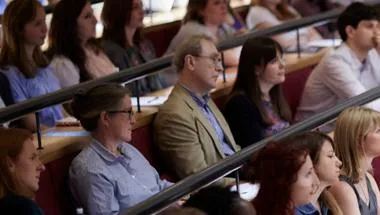
Biography
Jesse joined the Department of European & International Studies as a PhD candidate in September 2023, interested in the intersection of homosexuality and nativism and how both public opinion and party appeals combine nativist attitudes with sexual-liberal positions, as well as how these ideological configurations compare across European nations.
He is a recipient of the London Interdisciplinary Social Science Doctoral Training Partnership (LISS-DTP) studentship in Politics, Public Policy & Governance, funded by the Economic and Social Research Council (ESRC). He holds a BA in Political Studies from Queen Mary, University of London (2019 – 2022) and an MA in Human Rights Research (Law and Political Science) from the University of Manchester (2022-2023).
Entering education later in life, Jesse spent most of his early years working in business management for large international companies before developing an interest in politics and deciding to enter education. Whilst completing his studies, Jesse has held several positions, such as parliamentary researcher for the UK Parliament, data analyst for the Icelandic Constitutional Archives, and contributing content to academic textbooks such as Politics UK, as well as working on EU Horizon Project’s coding and analysing data relating to gender attitudes across political parties.
Research interests
- Comparative politics
- Mixed-methods
- Nationalism and nativism
- The Far Right
- Sexuality politics
- Masculinity
Teaching
4AAOB101: British Politics
4AAOB103: Introduction to Politics
6AAOB513: Far-Right Politics
Office hours
Monday: 16.00 - 18.00
Please book through Calendy:
https://calendly.com/jesse-grainger-kcl/office-hours-meeting
PhD research
My doctoral research examines how right-wing parties and publics across Europe combine liberal attitudes toward homosexuality with exclusionary stances on immigration - a phenomenon I conceptualise as homonativism. While populist radical right parties are usually associated with traditionalism and hostility to minorities, many have strategically adopted pro-LGBT positions to portray themselves as defenders of national identity against allegedly “illiberal” outsiders.
Using a mixed-methods design, my project analyses this dynamic at two levels. At the party level, I construct a new dataset of European right-wing party manifestos and combine it with expert survey data to track how positions on sexuality and immigration have shifted over time, when these issues are given salience, and where explicit homonativist appeals emerge. At the public level, I use European Social Survey data from over two decades to identify individuals who hold sexually liberal yet nativist attitudes, map their distribution across countries and regions, and assess which demographic and cultural factors shape the likelihood of adopting such views.
Together, these analyses show how liberal values can be re-framed in exclusionary ways, reshaping the boundaries of belonging in European democracies. By distinguishing homonativism from existing concepts such as homonationalism, my research highlights the strategic adaptability of nativist politics and the conditions under which selective inclusion becomes a tool of exclusion.
PhD supervisors
Dr Isabelle Hertner and Dr Russell Foster
Latest publications
Grainger, J. (2024) Why Israeli-palestinian tensions in the UK matter for ReformUK, Europinion. Available at: https://www.europinion.uk/post/why-israeli-palestinian-tensions-in-the-uk-matter-for-reformuk
Grainger, J. (2024) An emerging homo-nativist electorate?, British Politics and Policy at LSE. Available at: https://blogs.lse.ac.uk/politicsandpolicy/an-emerging-homo-nativist-electorate/
Grainger, J. (2024) ‘Coming In: Sexual Politics and EU Accession in Serbia - Koen Slootmaeckers’, Europe-Asia Studies, 76(5), pp. 813–814. doi:10.1080/09668136.2024.2339737
Research

Comparative Politics Research Group
The Comparative Politics research group hosts a research agenda based on political institutions, representation and regimes.

Queer@King's
Centre for research and teaching in gender and sexuality studies and a hub for collaborative work with queer activists, artists, and communities.

European Politics and Society Research Group
The European Politics and Society research group brings together scholars of all career stages to discuss ongoing work related to the changing identity, visions, capabilities, and relationships which shape contemporary Europe and Europeans.
News
Submissions sought for department's first conference
The first-ever conference hosted by the Department of European and International Studies has been announced and submissions are being sought.

Research

Comparative Politics Research Group
The Comparative Politics research group hosts a research agenda based on political institutions, representation and regimes.

Queer@King's
Centre for research and teaching in gender and sexuality studies and a hub for collaborative work with queer activists, artists, and communities.

European Politics and Society Research Group
The European Politics and Society research group brings together scholars of all career stages to discuss ongoing work related to the changing identity, visions, capabilities, and relationships which shape contemporary Europe and Europeans.
News
Submissions sought for department's first conference
The first-ever conference hosted by the Department of European and International Studies has been announced and submissions are being sought.

